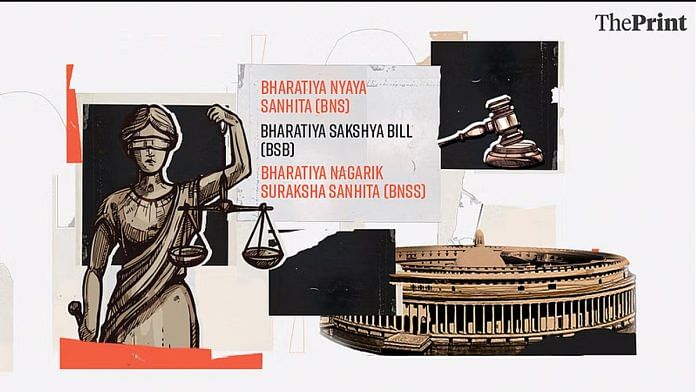India’s new criminal codes have run into trouble even before being implemented, evoking memories of the three hastily passed farm laws in 2020, all withdrawn unceremoniously after fierce protests by farmers.
The Bharatiya Nyaya Sanhita (BNS), Bharatiya Nagarik Suraksha Sanhita, and the Bharatiya Sakshya Act replace the colonial-era Indian Penal Code, the Code of Criminal Procedure, and the Indian Evidence Act of 1872 respectively, bringing in more relevant provisions. But like the farm laws, lack of prior consulting with stakeholders, low trust in the implementing authority, a deep disconnect between the government and the agencies, and, above all, devious political opportunism seem to reinforce the “good intent-bad content” syndrome.
Similar to the farmers’ protest, which had its epicentre in Punjab, the “steering chhodo hadtal” by an association of truck drivers reportedly intensified at Baddowal Toll Plaza in Jind, Haryana. Other transport associations elsewhere, including auto-rickshaw unions in Pune, Maharashtra, have called for the repeal of Section 104 (1) of the BNS dealing with death by negligence, as it applies to hit-and-run cases.
As word spread that some provisions of the new Act would result in stringent punishments for errant truck drivers in case of accidents, a section of them went on a flash strike, threatening to involve more protesters and create greater economic roadblocks. The Union home ministry quickly swung into action and held talks with the leaders of the All India Motor Transport Congress (AIMTC), with a promise to look into the issues raised by some truck drivers. The government has made it clear that the amendments are not specific to trucks but apply to all vehicles, private and public. The government has assured the truckers of further consultation. However, as expected, the “first family” of the Congress party has hastily and irresponsibly “slammed” the government over the new provisions, with Priyanka Gandhi Vadra calling them “Tughlaqi laws”.
Also Read: What’s the new law on hit-and-run cases and why transporters were protesting against it
New provisions benefit victims—and drivers
The provisions related to hit-and-run cases and accidents due to rash and negligent driving are aspects of the law that needed to be made more stringent.
The BNS Act, under Clause 106 and 106 (2), provides for a jail term of up to five and ten years respectively. In case of an accident, if the driver stops to provide medical help to the victim, ferries them to the nearest hospital, and/or reports to the nearest police station, the law takes a lenient view of the offence. If the driver runs away from the spot without reporting it to a police officer, the law takes a more serious view, resulting in bigger punishment.
Usually, in case of accidents, the passers-by tend to either crowd around the spot, start beating up the driver, or just ignore the victim. Most victims succumb to injuries in the absence of timely medical help. Moreover, lack of training, absence of civic sense, and apprehensions about legal complications, involving frequent visits to police stations and courts as witnesses to the accident, contribute to public apathy. Common reasons for road traffic accidents (RTA), which cause about 1.3 million deaths worldwide every year, include rash driving, not using helmets (or using substandard ones), and speaking on mobile phones while driving. The absence of road sense by pedestrians further contributes to mortalities. The drivers also fear mob lynching, which reportedly is the main reason for their disappearance from the accident spot.
Notably, a separate provision—Clause 101 (2)—under the new Act treats mob lynching as a criminal act punishable with a jail term and hefty fine. These two provisions in the new Act actually give much required relief to the driver of the vehicle in case of an unfortunate accident.
Also Read: Spare Parliament of one-upmanship. BJP needs to be tactful to counter opposition’s theatrics
Government must not buckle under pressure
It is important for the government to consider the larger picture and make necessary amendments to the entire surface transport system. Indian roads, especially in urban areas and overcrowded cities, are considered the most unsafe. Unplanned development of housing colonies, bad (or rather zero) maintenance of roads, shoddy construction, often due to corruption and systemic irregularities, are some of the reasons for traffic accidents and road rage cases.
With the President of India granting assent to the three criminal Bills, the government’s policy to do away with archaic laws, prune redundant provisions, and make the legal system more responsive to the challenges of the present time, has taken shape. The Modi government believes these changes to be significant milestones and a step towards obliterating the colonial stamp in the criminal justice system after 76 years of Independence.
If the home ministry assures that some provisions of these Acts will be subject to review before they are implemented, it is not known what procedures will be followed. The amendments to these Acts will have to be introduced in the next parliamentary session after the 2024 elections as the tenure of this Parliament may not allow any such schedule. Meanwhile, the government must establish a sufficiently strong damage control mechanism to address criticism of withdrawing good legislations under pressure from powerful, politically motivated cartels.
Seshadri Chari is the former editor of ‘Organiser’. He tweets @seshadrichari. Views are personal.
(Edited by Asavari Singh)



